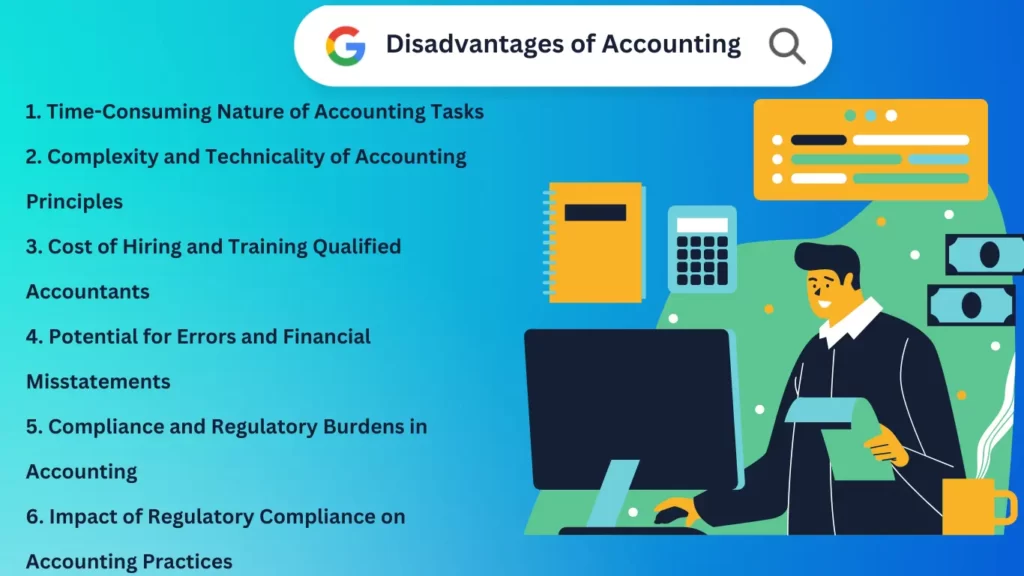Disadvantages of Accounting : Accounting is often hailed as the backbone of any successful business, providing valuable insights into financial performance and aiding decision-making processes. However, behind its apparent benefits, there are hidden costs that businesses need to be aware of.

In this article, we will delve into the disadvantages of accounting and shed light on the challenges businesses face in this realm.
limitations of accounting | Disadvantages of Accounting

1. Time-Consuming Nature of Accounting Tasks
One of the primary disadvantages of accounting is its time-consuming nature. From recording financial transactions to preparing financial statements, these tasks require meticulous attention to detail and significant time investment. Moreover, as businesses grow, the volume of transactions increases, further exacerbating the time commitment required for accounting.
The time spent on accounting tasks could be better utilized by businesses to focus on core operational activities, such as business development or customer service. Small businesses, in particular, often struggle with balancing accounting responsibilities alongside other essential functions due to limited resources. This time constraint can hinder their growth potential and leave them at a disadvantage compared to competitors who can allocate more time to strategic endeavors.
2. Complexity and Technicality of Accounting Principles
Another significant disadvantage of accounting lies in the complexity and technicality of accounting principles. Accounting operates within a framework of rules and regulations designed to ensure transparency and accuracy in financial reporting. However, these principles can be intricate and require specialized knowledge to navigate effectively.
Business owners and managers without a background in accounting may find it challenging to comprehend these principles fully. This lack of understanding can lead to errors in financial statements and misinterpretation of financial data. Moreover, the dynamic nature of accounting standards necessitates continuous learning and keeping up with updates, adding an additional layer of complexity to the process.
3. Cost of Hiring and Training Qualified Accountants
Hiring and training qualified accountants is a significant cost businesses must contend with. As mentioned earlier, accounting tasks necessitate expertise and specialized knowledge. Employing an in-house accounting team or engaging external accounting firms can be expensive, especially for small and medium-sized enterprises (SMEs) operating on limited budgets.
Outsourcing accounting functions to external firms may provide a cost-effective alternative for some businesses. However, this option still entails expenses and requires careful evaluation to ensure the quality and reliability of the outsourced services.
4. Potential for Errors and Financial Misstatements
Despite the meticulous nature of accounting, there is always a potential for errors and financial misstatements. Even with trained professionals overseeing the process, mistakes can occur due to various factors such as human error, software glitches, or misinterpretation of transactions.

To mitigate the risk of errors, businesses must implement robust internal controls, such as regular reconciliations and independent reviews. However, these control measures also come with their own costs, requiring dedicated personnel and time to execute effectively.
5. Compliance and Regulatory Burdens in Accounting
Compliance with accounting regulations and standards is crucial for businesses to maintain transparency and credibility. However, the ever-evolving landscape of regulations can pose a significant burden on businesses, especially those operating across multiple jurisdictions.
Moreover, the time and effort spent on compliance-related activities divert attention from strategic initiatives and core business functions. This imbalance can hinder innovation and impede businesses from seizing growth opportunities.
6. Impact of Regulatory Compliance on Accounting Practices
The impact of regulatory compliance on accounting practices is multi-faceted. On one hand, compliance measures ensure accurate financial reporting and protect stakeholders’ interests. On the other hand, the increasing complexity of regulations imposes additional burdens on businesses.
Accounting professionals must stay updated with regulatory changes, interpret the implications for their organizations, and implement necessary adjustments. This ongoing process demands time and effort, diverting resources from other value-adding activities.
Conclusion : Disadvantages of Accounting
In conclusion, while accounting plays a crucial role in business operations, it is essential to recognize and understand its disadvantages. The time-consuming nature, complexity of principles, costs of hiring and training qualified accountants, potential for errors, compliance burdens, and impact on accounting practices are all factors that businesses need to consider.
By acknowledging these disadvantages, businesses can better allocate resources, implement effective control measures, and make informed decisions to mitigate the hidden costs of accounting.